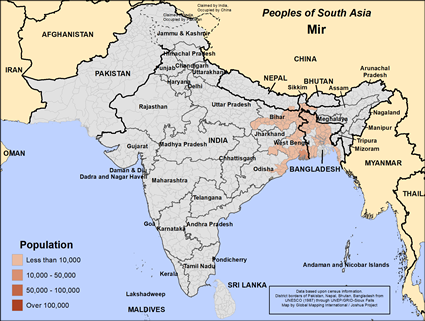Mir in India

Send Joshua Project a photo
of this people group. |

Map Source:
People Group data: Omid. Map geography: UNESCO / GMI. Map Design: Joshua Project.
|
| People Name: | Mir |
| Country: | India |
| 10/40 Window: | Yes |
| Population: | 49,000 |
| World Population: | 100,000 |
| Primary Language: | Bengali |
| Primary Religion: | Islam |
| Christian Adherents: | 0.00 % |
| Evangelicals: | 0.00 % |
| Scripture: | Complete Bible |
| Ministry Resources: | Yes |
| Jesus Film: | Yes |
| Audio Recordings: | Yes |
| People Cluster: | South Asia Muslim - other |
| Affinity Bloc: | South Asian Peoples |
| Progress Level: |
|
Introduction / History
The Bengali-speaking Muslim Mir people live predominantly in Bihar, West Bengal and other parts of eastern India. Historically, the Mir community has been involved in agriculture, trade and small-scale business. Over time, they have adapted to the region's evolving economic landscape, but many families still engage in traditional occupations. The Mir people have a long-standing presence in the region, contributing to the local economy through their work.
What Are Their Lives Like?
The Mir people primarily work in agriculture, cultivating crops such as rice, wheat and vegetables. In addition to farming, many families engage in small-scale trade, working as shopkeepers, traders or artisans. Some members of the community have also taken up jobs in nearby towns or cities, while others continue to rely on traditional agricultural practices for their livelihood.
Families in the Mir community live in close-knit villages, where they build homes from materials like brick, mud and thatch. Their daily lives revolve around family, work and religious observances. Though some younger members of the community seek education and employment opportunities in urban areas, many remain connected to their agricultural roots.
What Are Their Beliefs?
The Mir people practice Islam, following Sunni traditions. They observe the five pillars of Islam, which include daily prayers, fasting during Ramadan and giving to charity. The Mir community participates in religious festivals such as Eid al-Fitr and Eid al-Adha, gathering for prayers and communal celebrations.
Mosques play a central role in the spiritual and social lives of the Mir people, serving as places of worship and community gatherings. Religious leaders in the community guide both spiritual and practical aspects of life, reinforcing the teachings of Islam in daily activities.
What Are Their Needs?
The Mir people face several challenges related to education, healthcare and economic development. Many families still rely on traditional farming methods, which makes them vulnerable to environmental changes, such as unpredictable weather and poor soil conditions. Access to modern agricultural techniques and tools would help improve crop yields and stabilize their livelihoods.
Education is another significant need. Many children in the Mir community have limited access to quality schooling, particularly in rural areas. Expanding educational opportunities would open doors for the younger generation to pursue better employment prospects.
Healthcare services are often inadequate, with families having to travel long distances to access medical care. Improving healthcare infrastructure and providing more accessible services would enhance the community's overall well-being.
Prayer Points
Pray that believers would settle among the Mir people and share the ways of the savior with them.
Pray for all Christians in West Bengal to learn to grow more in love for one another as a testimony of Christ's goodness.
Pray for grace and truth to be instilled in their hearts.